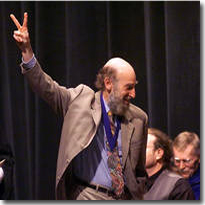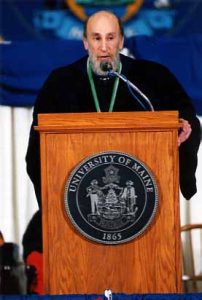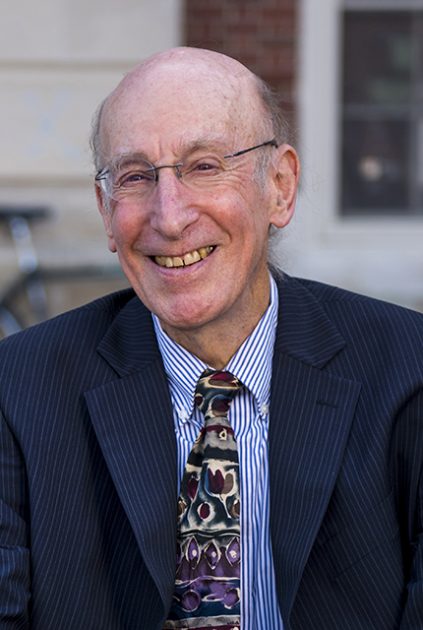Douglas Allen
 Here’s a photo of me receiving the 2000 Maine Distinguished Professor Award. This site will provide some biographical information about me, some information on my research and publications (with links to several of my publications), information on my teaching, and information on my peace and justice scholarship and activism. With my retirement in September 2020, I became Professor Emeritus of Philosophy and have remained very active, but I no longer teach courses.
Here’s a photo of me receiving the 2000 Maine Distinguished Professor Award. This site will provide some biographical information about me, some information on my research and publications (with links to several of my publications), information on my teaching, and information on my peace and justice scholarship and activism. With my retirement in September 2020, I became Professor Emeritus of Philosophy and have remained very active, but I no longer teach courses.

Douglas Allen Biography
Douglas Allen served as Professor of Philosophy at the University of Maine, USA, for 46 years (1974-2020) and became Professor Emeritus of Philosophy in September 2020. He served as Chairperson of the Department of Philosophy (1979-1982, 1998- 2003). He served as President of the international Society for Asian and Comparative Philosophy, 2001-2004, and is the Editor of the Lexington Books Series of Studies in Comparative Philosophy and Religion. Author and editor of 18 books and more than 150 book chapters and scholarly journal articles, he has been the recipient of Fulbright (1963-64, 2009-10) and Smithsonian (1992) grants to India, the Maine Presidential Research and Creative Achievement Award, and the Distinguished Maine Professor Award (given to the outstanding professor in teaching, research, and service). Douglas Allen is often recognized as one of the world’s leading scholars in the phenomenology of religion and the philosophy of Mahatma Gandhi. He knew Mircea Eliade very well and has authored four books on Eliade and the phenomenology of religion, including Structure and Creativity in Religion: Mircea Eliade and New Directions (Mouton, 1978) and Myth and Religion in Mircea Eliade (Routledge, 2002). While continuing to publish book chapters and articles every year on myth, symbolism, the phenomenology of religion, and other topics, Allen’s major focus in recent decades has been on the philosophy of Mahatma Gandhi (violence and nonviolence, war and peace, terrorism, truth, Vedanta, Hind Swaraj and the Bhagavad-Gita, marginality, technology, economic and environmental sustainability). He has authored and edited six Gandhi-informed books, including The Philosophy of Mahatma Gandhi for the Twenty-First Century (Lexington Books, 2008), Mahatma Gandhi (Reaktion Books, 2011), Gandhi after 9/11: Creative Nonviolence and Sustainability(Oxford University Press, 2019), and Special Issue on the Philosophy of Mahatma Gandhi (American Philosophical Association, 2022).
Significant journal articles and book chapters during 2022 include the following: “Is There a Future for the Philosophy of Religion?” Philosophy of Religion Website, Boston University, Feb. 2022 (http://www.PhilosophyOfReligion.org.); “The Moral, Philosophical, and Spiritual Basis of Gandhi’s Transformative Nonviolence,” in Gandhi’s Global Legacy, ed. by Veena Howard (Lanham, MD: Lexington Books, 2022); “Is Gandhi a Vedantist?” in Vedantic Lens to Address Contemporary Intellectual Challenges, ed, by Sukalyan Sengupta, Bal Ram Singh, and R.P. Singh (New Delhi: D.K. Printworld Ltd., 2022); “Is Gandhi’s Approach to Philosophy, Truth, and Nonviolence Really ‘Philosophical’?” Special Issue on the Philosophy of Mahatma Gandhi (American Philosophical Association, 2022); “Issues of War and Peace: Is Religion More of the Problem and What Are Mahatma Gandhi’s Insights?” Religions (Nov. 2022); “Author Speaks|With Douglas Allen|Gandhi After 9/11 (based on youtube interview by Prof. Dev Pathak and Sneha Alexander of the University of Delhi), Nov. 2022. A peace and justice scholar-activist, Doug Allen has been active in the Civil Rights Movement, the Vietnam/Indochina Antiwar Movement, the Anti-Apartheid Movement, and many other struggles resisting violence, war, class exploitation, imperialism, racial and gender oppression, and environmental destruction. He was a founder and has been an active member of the Maine Peace Action Committee (1974-present) and served as Education Coordinator of the Peace and Justice Center of Eastern Maine (1988-2017). He has been the recipient of the “Hands of Peace Award” in Maine and the “Scroll of Peace International Award for Peace Research” in India. Douglas Allen Professor Emeritus of Philosophy 6 Charles Street, Orono, Maine 04473 USA tel: 207.866.7782, 207.944.8405 (cell), fax: 207.581.2928 email: dallen@maine.edu
Teaching
I served as a Professor of Philosophy at the University of Maine for 46 years before retiring in the fall of 2020. I loved teaching and greatly enjoyed my lively interactions with my students. My curriculum vitae provides extensive information on my areas of teaching and various teaching honors. My teaching experience included Banaras Hindu University in India (1963-64) as a Fulbright Instructor; Southern Illinois University (1967-72) as Instructor and Assistant Professor; Vanderbilt University (1972-73) as Visiting Assistant Professor; Central Connecticut State University (1973-74) as Assistant Professor; and the University of Maine (1974-2022) as Assistant Professor, Associate Professor, and Full Professor (since 1981). I served as Chairperson of Philosophy (1979-82 and 1998-2003). I was also a member of the Graduate Faculty. I taught the following courses at the University of Maine: Introduction to Philosophy; Introduction. to Religious Studies; Social Issues in Recent Religious and Philosophical Thought; Problems of Philosophy; Honors; Marxist Philosophy (Marx); Twentieth Century Marxist Philosophy; The Nature of Religious Experience; Hinduism; Buddhism; Views of Self: East and West; Theories of Myth; Mircea Eliade; and Mahatma Gandhi. At other universities, I have taught the following courses: Ethics; History of Modern Philosophy; Philosophy of Religion; and Afro-American Philosophy. I have also taught Graduate seminars on Indian Philosophy and the Phenomenology of Religion. Also directly relevant to my teaching at the University of Maine are the following: Coordinator of the Marxist-Studies Interdisciplinary Minor for which I taught the foundational course on the philosophy of Karl Marx and coordinated the weekly Socialist and Marxist Studies Lecture Series; Past Coordinator of the interdisciplinary Religious Studies Minor for which I taught the foundational Introduction to Religious Studies course; regular lecturer for the Honors Program; Faculty Advisor and active participant in the Maine Peace Action Committee; and numerous presentations on and off campus. Since retirement, I have actively continued to serve as the co-advisor of the Maine Peace Action Committee and the coordinator of the Socialist and Marxist Studies Lecture Series. I have continued to present many Zoom, webinar, and other lectures in Maine, throughout the USA, and especially in India. During 2022-2023, I teach an Independent Readings course on Gandhi with a Ph.D. student, serve on her Dissertation Committee, and serve on the Honors Thesis Committee of an undergraduate student. You can click here to view the recording of the lecture program that I gave on Nov. 10, 2022 to the Honors students, focusing on the philosophy of Karl Marx.
Research and Publications
Douglas Allen served as Professor of Philosophy at the University of Maine, USA, for 46 years (1974-2020) and became Professor Emeritus of Philosophy in September 2020. He served as Chairperson of the Department of Philosophy (1979-1982, 1998- 2003). He served as President of the international Society for Asian and Comparative Philosophy, 2001-2004, and is the Editor of the Lexington Books Series of Studies in Comparative Philosophy and Religion. Author and editor of 18 books and more than 150 book chapters and scholarly journal articles, he has been the recipient of Fulbright (1963-64, 2009-10) and Smithsonian (1992) grants to India, the Maine Presidential Research and Creative Achievement Award, and the Distinguished Maine Professor Award (given to the outstanding professor in teaching, research, and service).
Allen’s major areas of research specialization are Phenomenology (especially Phenomenology of Religion); Eastern Philosophy and Religion (especially Hinduism and Buddhism), the phenomenology of Mircea Eliade; the philosophy of Mahatma Gandhi, Marxism and Political Philosophy (especially Karl Marx); and Comparative East-West Philosophy and Religion. In recent years, most of Allen’s publications have been in two areas: first, phenomenology of religion, in general, and the phenomenology of Mircea Eliade, in particular; second, various peace, nonviolence, and justice topics, in general, and the philosophy and practice of Mohandas (Mahatma) Gandhi, in particular.
Douglas Allen is often recognized as one of the world’s leading scholars in the phenomenology of religion and the philosophy of Mahatma Gandhi. He knew Mircea Eliade very well and has authored four books on Eliade and the phenomenology of religion, including Structure and Creativity in Religion: Mircea Eliade and New Directions (Mouton, 1978) and Myth and Religion in Mircea Eliade (Routledge, 2002).
While continuing to publish book chapters and articles every year on myth, symbolism, the phenomenology of religion, and other topics, Allen’s major focus in recent decades has been on the philosophy of Mahatma Gandhi (violence and nonviolence, war and peace, terrorism, truth, Vedanta, Hind Swaraj and the Bhagavad-Gita, marginality, technology, economic and environmental sustainability). He has authored and edited six Gandhi-informed books, including The Philosophy of Mahatma Gandhi for the Twenty-First Century (Lexington Books, 2008), Mahatma Gandhi (Reaktion Books, 2011), Gandhi after 9/11: Creative Nonviolence and Sustainability (Oxford University Press, 2019), and Special Issue on the Philosophy of Mahatma Gandhi (American Philosophical Association, 2022).
Significant journal articles and book chapters during 2019-2021 include the following: “Mahatma Gandhi’s Philosophy of Nonviolence and Truth: The Key Values and Concepts for Gandhi 150 and the Future,” The Acorn: Philosophical Studies in Pacifism and Nonviolence, vol. 19, no. 1 (Spring 2019): 1-14; “Philosophy and Practice: A Gandhi-informed Approach,” in Gandhi and the Contemporary World, ed. by Sanjeev Kumar (New Delhi: Routledge, 2020), pp. 27-43; “Understanding Religion: Interpretation and Explanation,” in Explaining, Interpreting, and Theorizing Religion and Myth: Contributions in Honor of Robert A. Segal. Series: Supplements to Method & Theory in the Study of Religion: 16, ed. by Nickolas P. Roubekas and Thomas Ryba (Leiden: Brill Publishers, 2020), pp. 42-69; “Philosophies of Becoming: Mythic Constructions, the Buddha’s Philosophy, and Gandhi’s Philosophy,” in The Time is Now: Essays on the Philosophy of Becoming, ed. by Mihaela Gligor (Bucharest: Zeta Books, 2020), pp. 23-61.
Significant journal articles and book chapters during 2022 include the following: “Is There a Future for the Philosophy of Religion?” Philosophy of Religion Website, Boston University, Feb. 2022 (http://www.PhilosophyOfReligion.org.); “The Moral, Philosophical, and Spiritual Basis of Gandhi’s Transformative Nonviolence,” in Gandhi’s Global Legacy, ed. by Veena Howard (Lanham, MD: Lexington Books, 2022); “Is Gandhi a Vedantist?” in Vedantic Lens to Address Contemporary Intellectual Challenges, ed, by Sukalyan Sengupta, Bal Ram Singh, and R.P. Singh (New Delhi: D.K. Printworld Ltd., 2022); “Is Gandhi’s Approach to Philosophy, Truth, and Nonviolence Really ‘Philosophical’?” Special Issue on the Philosophy of Mahatma Gandhi (American Philosophical Association, 2022); “Issues of War and Peace: Is Religion More of the Problem and What Are Mahatma Gandhi’s Insights?” Religions (Nov. 2022); “Author Speaks|With Douglas Allen|Gandhi After 9/11 (based on youtube interview by Prof. Dev Pathak and Sneha Alexander of the University of Delhi).
Peace and Justice
A major part of Douglas Allen’s personal values, scholarly career, activities, and commitments has been as a peace and justice scholar activist. Doug Allen first became a peace and justice activist in the Civil Rights Movement in the South. In the 1960s and 1970s, he devoted much of his time to the antiwar movement attempting to end the war in Vietnam and other parts of Indochina. For a decade, he was actively involved in the anti-apartheid movement attempting to end the racist system in South Africa and resist U.S. and university complicity in profiting from such racism. Over the decades, he has continued to be active in struggles dealing with violence and war, sexism, homophobia, classism, racism, human rights violations, imperialism, and environmental devastation. As can be seen in Doug Allen’s curriculum vitae and publications, much of his scholarship has been shaped by peace and justice priorities and commitments. For example, this commitment has involved writing books and articles on the Vietnam War; religious-political conflict in India, South Asia, and the Middle East; Gandhi, King, and nonviolence; class exploitation, capitalism, socialism, imperialism, and U.S. policies; and issues related to racism and sexism. A major academic peace and justice commitment has been Allen’s role as coordinator of the remarkable Socialist and Marxist Studies Series at the University of Maine. The main sponsor of this weekly series is the interdisciplinary Marxist-Socialist Studies Minor at the University of Maine of which Allen served as the coordinator until his retirement in 2020. The weekly series, began in 1988, and Allen has served as the coordinator continuing through 2022. The lecture series has had over 600 programs on a tremendous diversity of topics. This is one of the outstanding educational offerings at the university with consistently well-attended programs, excellent presentations, lively discussions, and extensive media coverage. During 2021-2022, Doug Allen delivered lectures for the series on “Moral, Philosophical, and Spiritual Nonviolence and Socialism in 2021,” “Development: Modern Capitalist Perspectives and Gandhi-Informed and Marx-Informed Socialist Perspectives,” “Socialism in 2022,” and “With So Much Violence in the United States and the Contemporary World, How Can Nonviolence Be Relevant and Effective?” Some of the programs are available on the Socialist and Marxist series website. In addition to writing books, chapters, and scholarly articles, Doug Allen has devoted a lot of time to more popular peace and justice writing, media work, and presentations. As can be seen on his curriculum vitae, he has given many peace and justice talks at conferences, universities, and to civic and religious gatherings in the community, nationally, in India, and internationally. In recent years, many of Doug’s talks have focused on 9/11 in the USA and 26/11 in India, the root causes and systemic relations of terrorism, the Iraq War, reinterpreting Gandhi’s philosophy and practices, and a deeper and broader understanding of multidimensional and structural violence and nonviolence. In Maine, Doug Allen’s two major peace and justice commitments have been the Maine Peace Action Committee at the University of Maine and the Peace and Justice Center of Eastern Maine in Bangor. Doug Allen helped found MPAC in 1974 when he joined the faculty of the University of Maine, and he has served as faculty advisor and has been an active participant for over 48 years. After his retirement Doug became the co-advisor with Sonja Birthisel. MPAC, one of the oldest university student-oriented peace and justice groups in the USA, has had a remarkable, educational, activist history. MPAC meets weekly, organizes peace and justice film series, book discussion groups, and other educational programs, organizes rallies, and mobilizes people around different peace and justice issues. Among MPAC’s many accomplishments, Doug played a leadership role in the struggle that resulted in the University of Maine divesting about $3,000,000 from corporations and banks doing business in apartheid South Africa and becoming one of the first U.S. universities to agree to complete divestment. The remarkable Maine Peace Action Committee Newsletter completed Volume 47 (47 years of publication) in Spring 2022. Doug writes an essay contribution for each issue of the MPAC Newsletter. With the founding of the Peace and Justice Center of Eastern Maine in 1988, Doug Allen served as the Education Coordinator for 30 years until 2017. His partner Ilze Petersons served as the Center’s Coordinator for many years. Consisting of a large network of progressive individuals and groups located throughout Eastern Maine, the Center has been a major peace and justice presence. Over the decades, Doug organized the monthly Peace and Justice Center Film Series and coordinated discussions after films; wrote articles for the Peace and Justice Center of Eastern Maine Newsletter; and devoted considerable time to giving talks, doing media work, organizing conferences and other educational programs, mobilizing people and engaging in nonviolent activist marches, demonstrations, and other struggles.

